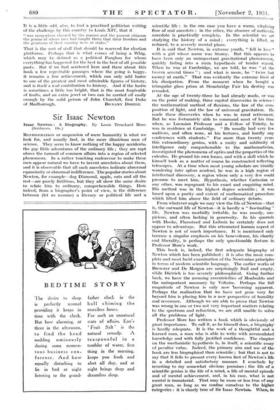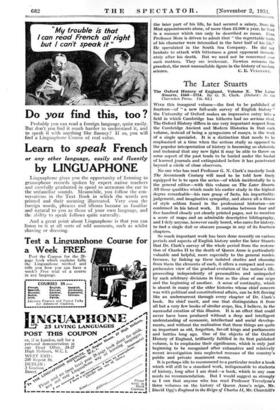Sir Isaac Newton Isaac Newton : A Biography. By Louis
Trenchard More. (Scribners. 18s.) REFRIGERATION or suspension of mere humanity is what we look for, and usually find, in the more illustrious men of science. They seem to know nothing of the happy accidents, the gay little adventures of the ordinary life ; they are rapt above the turmoil of common affairs into a region of selected phenomena. In a rather touching endeavour to make these men appear natural we have to invent anecdotes about them, and it is observable that all such anecdotes indicate abnormal equanimity or abnormal indifference. The popular stories about Newton, for example—dog Diamond, apple, cats and all the rest—are purely fictitious, but they all show the same desire to relate him to ordinary, comprehensible things. Here indeed, from a biographer's point of view, is the difference between (let us assume) a literary or political life and a
_scientific life : in the one case you have a warm, vitalizing flow of real anecdote ; in the other, the absence of authentic anecdote is practically complete. In the scientist we are studying the history of a mind ; everything is lifted, or reduced, to a severely mental plane.
It is said that Newton, in extreme youth, " fell in love" with a girl whose name was Storey. But this appears to have been only an unimportant gravitational phenomenon, quickly fading into a mere hypothesis of tender regard. When he was at Cambridge, we are told, he was " at the tavern several times " ; and what is more, he " twice lost money at cards." That was evidently the extreme limit of his dissipation. From the moment when he bought a triangular glass prism at Stourbridge Fair his destiny was revealed.
At the age of twenty-three he had already made, or was on the point of making, three capital discoveries in science : the mathematical method of fluxions, the law of the coin. position of light, and the law of universal gravitation. He made these discoveries when he was in rural retirement. But he was fortunately able to command most of his time when, as Lucasian Professor and a Fellow of Trinity, he was in residence at Cambridge. " He usually had very few auditors, and often none, at his lectures, and hardly any conferences with students." For more than twenty years this extraordinary genius, with a rarity and sublimity of intelligence only comprehensible to the mathematician, investigated the phenomena of optics and the properties of the calculus. He ground his own lenses, and with a skill which he himself took as a matter of course he constructed reflecting telescopes. At a time when most young scholars are timidly wandering inter sylvas academi, he was in a high region of intellectual discovery, a region where only a very few could presume to meet him. Hypothesis, whether Cartesian or any other, was repugnant to his exact and enquiring mind. His method was in the highest degree scientific ; it was based upon a purity and extent of mathematical procedure which lifted him above the field of ordinary debate.
From whatever angle we may view the life of Newtonthat is, the outward life of Newton—it is hardly a " fascinating" life. Newton was morbidly irritable, he was moody, sus- picious, and often lacking in generosity. In his quarrels with Hooke, Flamsteed and Leibniz he certainly does not appear to advantage. But this attenuated human aspect of Newton is not of much importance. It is mentioned only because a singular emphasis on his benevolence, his charity and liberality, is perhaps the only questionable feature in Professor More's work.
This book is, indeed, the first adequate biography of Newton which has been published ; it is also the most com- plete and most lucid examination of the Newtonian principles in terms of modern scientific language. The earlier works of Brewster" and De Morgan are surprisingly frail and empty, While Dietrich is too severely philosophical. Going further back, we have the amusing eccentricities of Monboddo and the unimportant summary by Voltaire. Perhaps the full magnitude of Newton is only now becoming apparent. Perhaps the realization that we have not gone very far beyond him is placing him in a new perspective of humility and reverence. Although we are able to prove that Newton was wrong in one or two not very important matters relating to the spectrum and refraction, . we Are still unable to solve all the problems of light.
Professor More has written a book which is obviously of great importance. To call it, as he himself does, a biography' is hardly adequate. It is the work of a thoughtful and a learned man, a man who is able to write with accumulated knowledge and with fully justified confidence. The chapter on the mechanistic hypothesis is., in itself, a scientific essay of peculiar value. Indeed, the primary aim and use of the book are less biographical than scientific ; but that is not to say that it fails to present every known fact of Newton's life in a detailed and satisfactory manner. I conclude by reverting to my somewhat obvious premises : the life of a scientific genius is the life of a mind, a life of mental episode and of mental achievement, and, in his case, what is not mental is immaterial. That may be more or less true of any great man, so tong as we confine ourselves to the higher .categories : it is clearly true of Sir Isaac Newton, When, in
the later part of his life, he had secured a salary, from his Mint appointments alone, of more than £2,000 a year, he lived in a manner which can only be described as mean. Eves Professor More is driven to admit that ” the regrettable traits of his character were intensified in the later half of his life." He speculated in the South Sea Company. He did not hesitate to attack with bitterness a great opponent immedi. ately after his death. But we need not be concerned over such matters. They arc irrelevant. Newton remains the grandest, the most unassailable figure in the history of modem















































 Previous page
Previous page